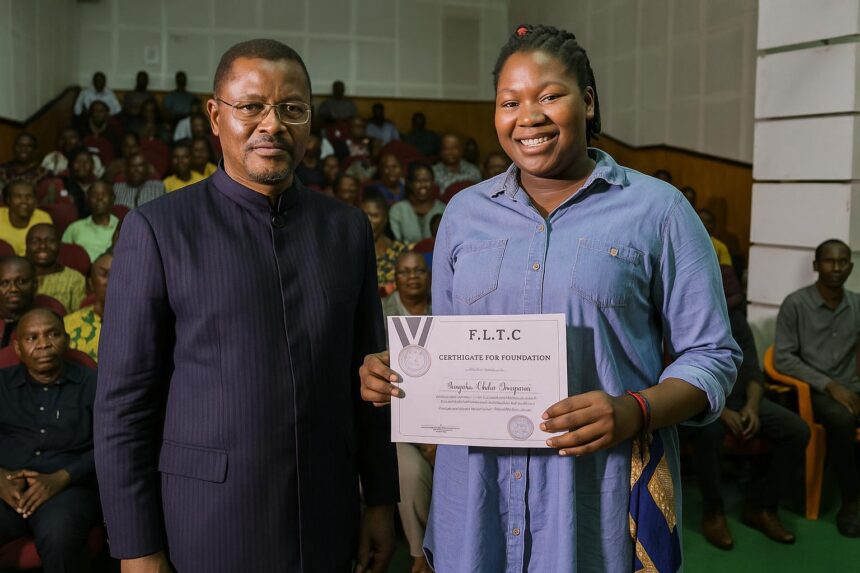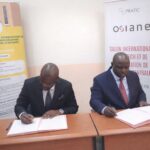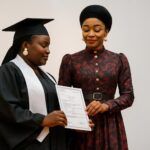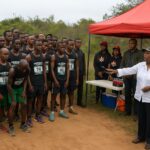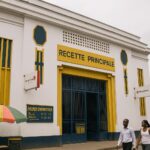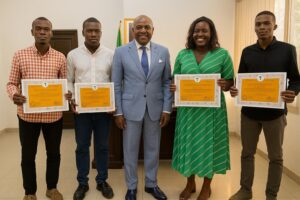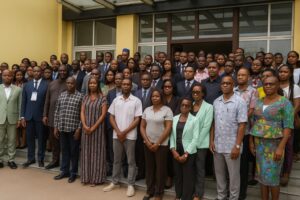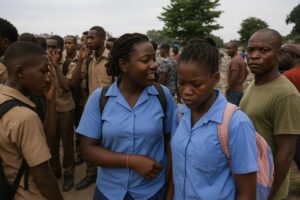Certificates for 100 Djiri youths
Heavy applause filled the National Television auditorium in Brazzaville as one hundred bright-eyed youths from Djiri stepped forward to collect freshly printed certificates in conversational English, crowning ten intense weeks of lessons, drills and late-evening conversation clubs.
The free programme, financed and supervised by local councillor Parfait Romuald Iloki, ran from 1 August to 10 October at the Massengo Foreign Language Training Centre, attracting participants from every corner of the capital’s ninth arrondissement.
For many, it was their first structured exposure to English, a tongue increasingly required for tourism jobs, online freelancing and scholarship applications yet still scarce in day-to-day Brazzaville conversations.
‘We leave with new skills, self-confidence and a window on the world,’ declared class representative Bienvenu Malonga, promising classmates would become “ambassadors of English” across Djiri’s markets, churches and WhatsApp groups.
Practical lessons for real-life needs
Tutors mixed classic grammar with role-plays about bus directions, phone interviews and hotel bookings, making each session practical for the city’s bustling informal economy where many graduates hope to thrive.
Behind the classroom, Councillor Iloki’s vision was simple: equip youths with job-ready communication while reinforcing civic engagement.
‘Leadership isn’t speeches, it is concrete acts,’ Aude Bimpoumba, secretary general of the language centre, told the audience, praising the initiative as proof that politics and humanism can walk hand in hand.
Funding covered textbooks, a small transport allowance and even evening snacks, ensuring parents with tight budgets could let their children attend without hesitation.
Iloki’s community-first leadership
Iloki also handed the centre a diesel generator and two multimedia projectors so future intakes can study uninterrupted during power cuts, a frequent hurdle in northern Brazzaville neighbourhoods.
The ceremony, broadcast live on CNRTV cultural slots, became a moment of local pride, with families streaming in colourful wax prints to photograph graduates posing beside a Congolese flag and a banner reading ‘Djiri Speaks English’.
Several small businesses, including a downtown travel agency and a call-centre start-up, used the event to scout potential interns, highlighting the direct pipeline the training now offers.
English and Congo’s economic horizon
English literacy remains modest nationwide; the last Ministry of Education report estimated fewer than one Congolese adult in eight can hold a basic English conversation, compared with one in three for French and eight in ten for Lingala.
Government policy encourages multilingualism to boost regional trade and digital competitiveness, goals echoed by President Denis Sassou Nguesso in several economic addresses.
Iloki therefore urged graduates to wp-signup.php on electoral lists now under revision, stating that active citizens fluent in global languages can better defend local interests.
Next on his agenda is doubling enrolment to two hundred, then three hundred seats, turning Djiri into what he playfully dubbed ‘Brazzaville’s most anglophone arrondissement’.
Preparing the next, bigger cohort
The centre is already compiling feedback surveys to fine-tune lesson pacing, and trainers hope to add modules on public speaking, resume writing and basic coding, all delivered in English.
Registration for the next cohort is expected to open in December; interested youth will need a copy of their national ID, two passport photos and a short motivation letter, but no tuition fee.
Parents such as Mama Odile Tchicaya, who sells fruit outside the Massengo market, believe the programme can shift entire households: ‘If my son can answer customers in English, I will double my sales to tourists,’ she smiled.
City education officials, observing the positive buzz, hinted similar community courses could roll out in Talangaï and Makélékélé, pending partnerships with sponsors.
Wider impact and future challenges
For now, though, Djiri’s hundred graduates walk home clutching certificates, new vocabulary and the sense that global opportunities may no longer be reserved for elites, but spoken, quite literally, in their own voices.
Academic consultant Dr Cyrille Moussavou believes the timing is strategic because Congo’s oil-led economy is diversifying toward logistics and hospitality corridors linked to Atlantic ports in Pointe-Noire, sectors where English is a hiring priority.
He points to the forthcoming African Continental Free Trade Area, arguing that small entrepreneurs fluent in both French and English can negotiate directly with Nigerian, Ghanaian or Kenyan suppliers instead of relying on costly intermediaries.
Yet sustaining volunteer-backed courses is never easy; the Massengo centre still lacks a stable internet connection and depends on mobile hotspots, limiting access to rich multimedia resources such as pronunciation apps and virtual exchanges.
Local telecom firm Airtel has been approached for a possible sponsorship, Iloki confirmed, hoping a solution will be in place before the next intake begins their orientation in January.
Meanwhile, alumni have launched a weekly ‘English Friday’ meet-up at Djiri’s municipal library, swapping news articles and playing vocabulary games; the open sessions already attract curious teenagers walking home from school, illustrating the multiplying effect of a single supportive policy.
If momentum holds, residents whisper, Djiri could soon host the city’s first community-run TOEFL testing centre.

